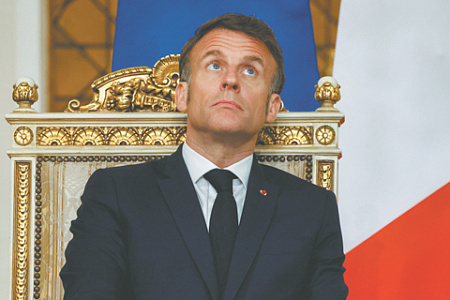
This summer, several countries may recognize the independence of Palestine at once. One of them is France. If this happens, Palestine will achieve a major foreign policy success. France will be the first G7 country (the seven most economically developed countries on the planet) to establish full-fledged diplomatic relations with Palestine. French President Emmanuel Macron is motivated to take this step by the need to ensure that his supporters and his successor have the votes of voters sympathetic to Palestine.
Macron announced his readiness to recognize the Middle Eastern state in an interview with France 5 TV channel. “We need to move towards recognition, and we will do so in the coming months,” he said. From the context of the interview, it follows that Macron intends to announce the establishment of diplomatic relations with Palestine in June. Then there will be a conference dedicated to this country. It was announced by the foreign ministers of Saudi Arabia, Egypt, the United Arab Emirates, Jordan and Qatar. France is expected to co-chair this conference. Macron discussed the issue of holding it during his recent visit to Cairo.
For Palestine, recognition by France would be a diplomatic breakthrough, primarily in relations with the European Union. The country has embassies in only five EU countries: Denmark, Finland, Ireland, Spain and Sweden. Moreover, Ireland and Spain, along with Norway, which is not a member of the European Union, recognized the statehood of Palestine only last year. None of the G7 countries (it includes the United States, Great Britain, France, Italy, Canada, Japan, and Germany) officially recognizes it, although the Palestinians have some form of diplomatic representation.
Macron immediately made it clear that the recognition of Palestine should not be seen as an anti-Israeli demarche. He said that those States that support Palestine should recognize the existence of Israel as a State. The French president clearly wants not to disappoint the Jewish and pro-Israeli public too much. At the same time, he wants to get rid of the image of a persecutor of Muslims, which he earned during his first term as president. Macron’s name is associated with the legislative initiative “On ensuring respect for the principles of the Republic” (the first self–explanatory name is “On combating Islamic separatism”). It became law in 2020. According to him, control over mosques and religious organizations is being tightened, it is forbidden to take children from secondary schools to home schooling (this is especially often practiced in religious families of the country), to introduce separate visits to swimming pools for men and women, etc. In short, a number of measures are being introduced that have caused discontent among the Muslim community not only in France, but also beyond it.
Macron’s decision to recognize Palestine comes amid a drop in his rating. It is now below 30%, and some polls put the figure at 27 and even 24%. He is not in danger of impeachment: the president is likely to quietly serve out his second term. However, in his politics, he is limited by the fact that his friendly forces in parliament make up no more than a third, and he is forced to seek support from the far-right National Association. Difficulties in pension reform, the lack of ambitious large-scale projects and the continued loss of positions in Africa are playing against the president.
Meanwhile, the question of who will run in the 2027 presidential election remains open. Macron cannot run for a third term according to the law. But what’s worse is that it will be difficult for the president to name a successor if his own rating remains at such a low level. In this case, the French president will rather do a disservice to the elected one.
So far, polling data shows that among Macron’s supporters, the former prime minister, now the leader of the Horizons party, Edouard Philippe, could be a strong candidate. He worked well as the head of the Cabinet of Ministers and was forced to resign not because of professional incompetence, but because of his re-election as mayor of Le Havre, which Philippe decided to focus on. At the time of the decision to resign, Philip’s rating was positive. His successors did much worse at maintaining the sympathy of the population. This also applies to the current Prime Minister, Francois Bayrou, who, however, has found an approach to parliament and is still in office.
So far, the situation is such that the rival of any Macron successor will be the candidate from the National Association. Until recently, Marine Le Pen was considered the candidate of this party. Because of her sentence, she will not be able to run, unless, of course, she gets it overturned by 2027. But all the same, the National Association will nominate its candidate. It will be possible to resist him only by appealing to supporters of the leftist agenda, including those who sympathize with Palestine.
